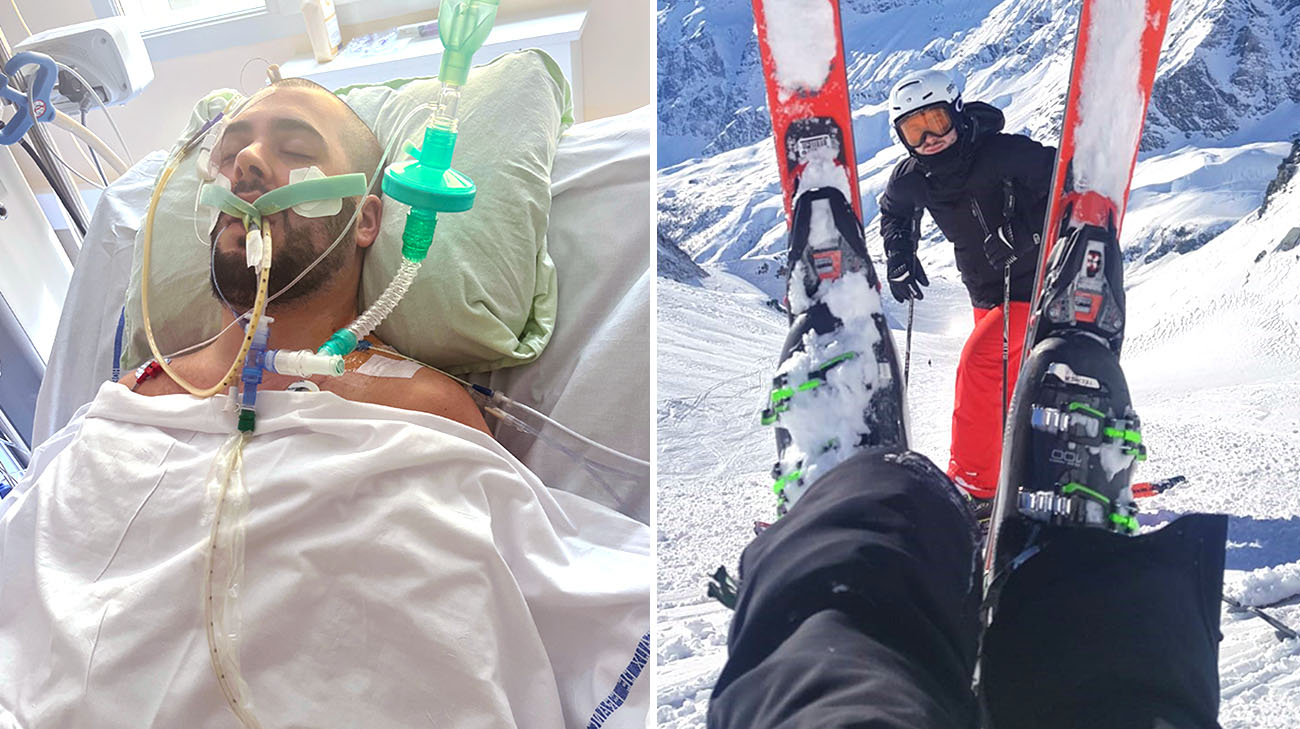
Eyes slowly opening, Eli Lew struggled to get his bearings. Glancing about the room, where friends and family stared at him with concern, Eli – intubated with nurses standing by – quickly realised he was in a hospital. He guessed he was in France where he had been skiing with his brother and brother-in-law. Unable to speak, Eli thought to himself, “I must be dying.” But he didn’t know why he was there.
“When I woke up, I was effectively on another planet,” says Eli, a 35-year-old acquisitions manager for a real estate company back home in London, England. “I didn’t believe anything they were saying to me. I kept thinking of the word ‘suspicious’ as I just couldn’t comprehend what had happened.”
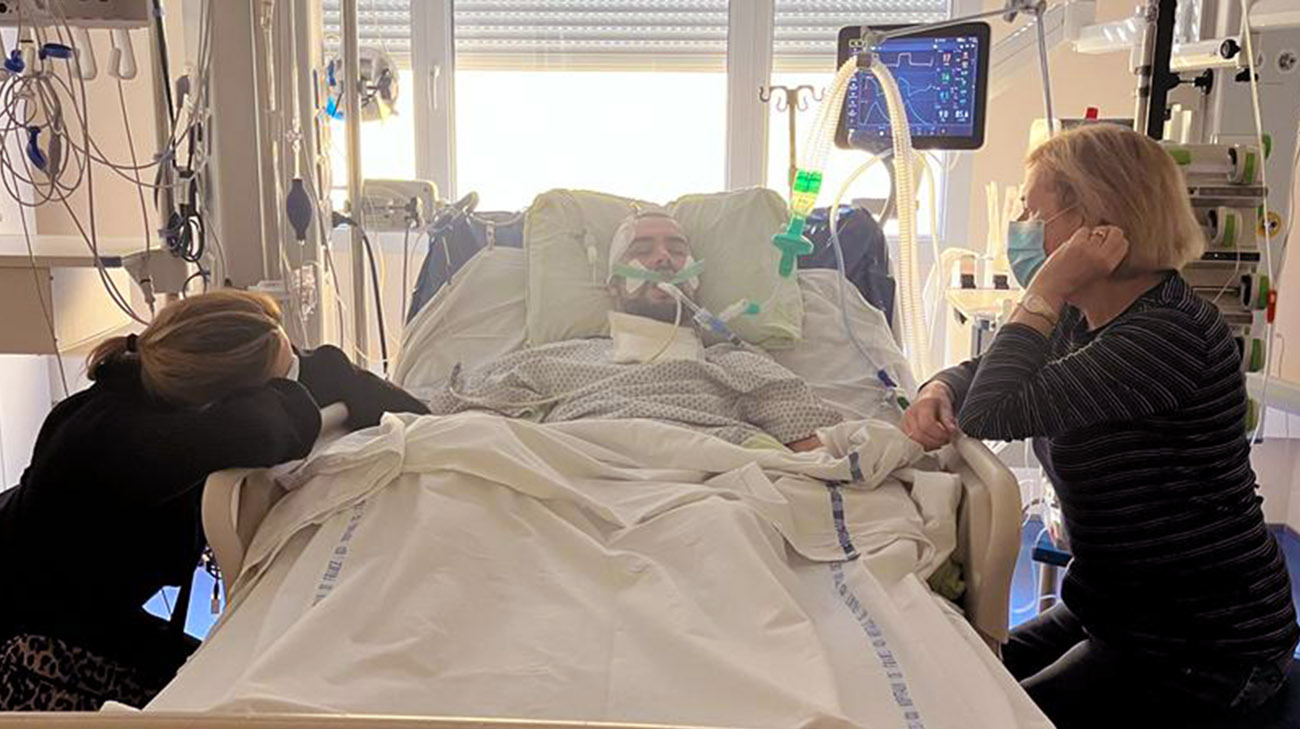
Eli suffered a traumatic brain injury while skiing on the slopes in France. (Courtesy: Eli Lew)
Hearing Eli articulately recount his journey nine months later, one would never realise he has no memory of the incident. Eli suffered a trauma-related subarachnoid hemorrhage to his helmet-covered head in a skiing accident near the end of an afternoon run at Châtel, a resort in the French Alps. The injury, which occurred when he fell headfirst into a rocky ditch while trying to avoid another skier hurtling into his path, caused bleeding between his brain and the thin tissues that protect it. He also suffered fractures to his ribs and collarbone.
Miles from a hospital or medical center, Eli was first treated by two doctors, on holiday from northern England, who offered aid when they saw people gathered around his motionless body. Their quick action before a medical helicopter arrived – intubating him, to enable normal breathing – undoubtedly helped save Eli’s life. He was flown to a hospital in Annecy, an alpine town in southeastern France, where doctors drilled a hole in his skull, inserting a tube to drain blood and fluid from his brain.
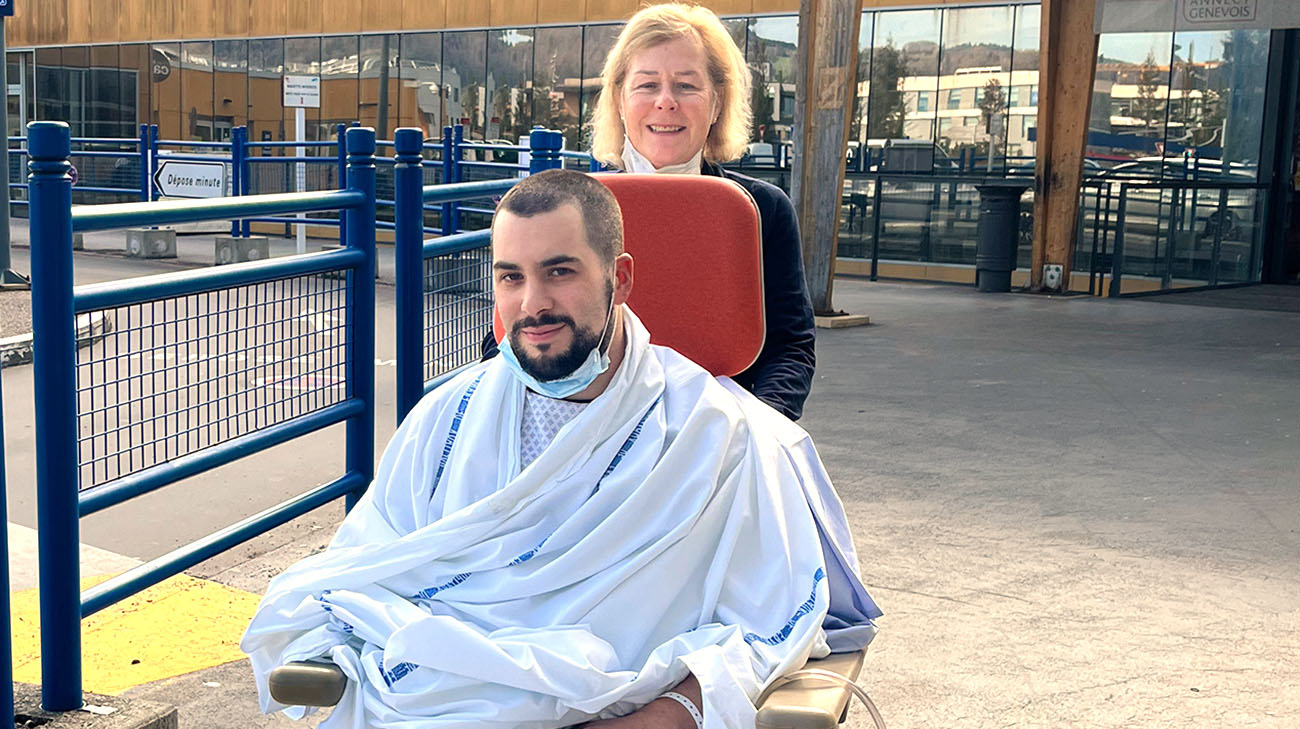
Eli with his mother outside a hospital in Annecy, prior to being admitted to Cleveland Clinic London for four weeks. (Courtesy: Eli Lew)
Following three weeks of treatment at the Annecy hospital, Eli flew back to London and was admitted to Cleveland Clinic London for four weeks. There, under the direction of consultant neurologist Dr Arvind Chandratheva, he underwent intensive, daily rehabilitation sessions from a multidisciplinary team of experts in speech and language therapy, occupational therapy and physiotherapy, as well as consultations in neuropsychology and neuropsychiatry. The comprehensive team also monitored other physical injuries to his ribs, adrenal glands and liver.
In large part, Eli attributes his recovery, including regaining his speech, strength, cognitive skills, walking, running and exercising without difficulty, to the care he received at Cleveland Clinic London during his in-patient stay at the neurological rehabilitation unit. Says Eli, “Cleveland Clinic was literally the best place in the world for me to recover.”
According to Katrina Clarkson, who was Eli’s speech and language therapist, the team spent several days thoroughly assessing Eli’s verbal, cognitive, physical and psychological capabilities in order to map out a personalised treatment plan. She administered screening tools including a high level language test, which ascertains language, cognitive and communications skills, as well as Functional Assessment of Verbal Reasoning and Executive Strategies or FAVRES, which determines verbal reasoning, complex comprehension, discourse and other functions necessary for everyday tasks.
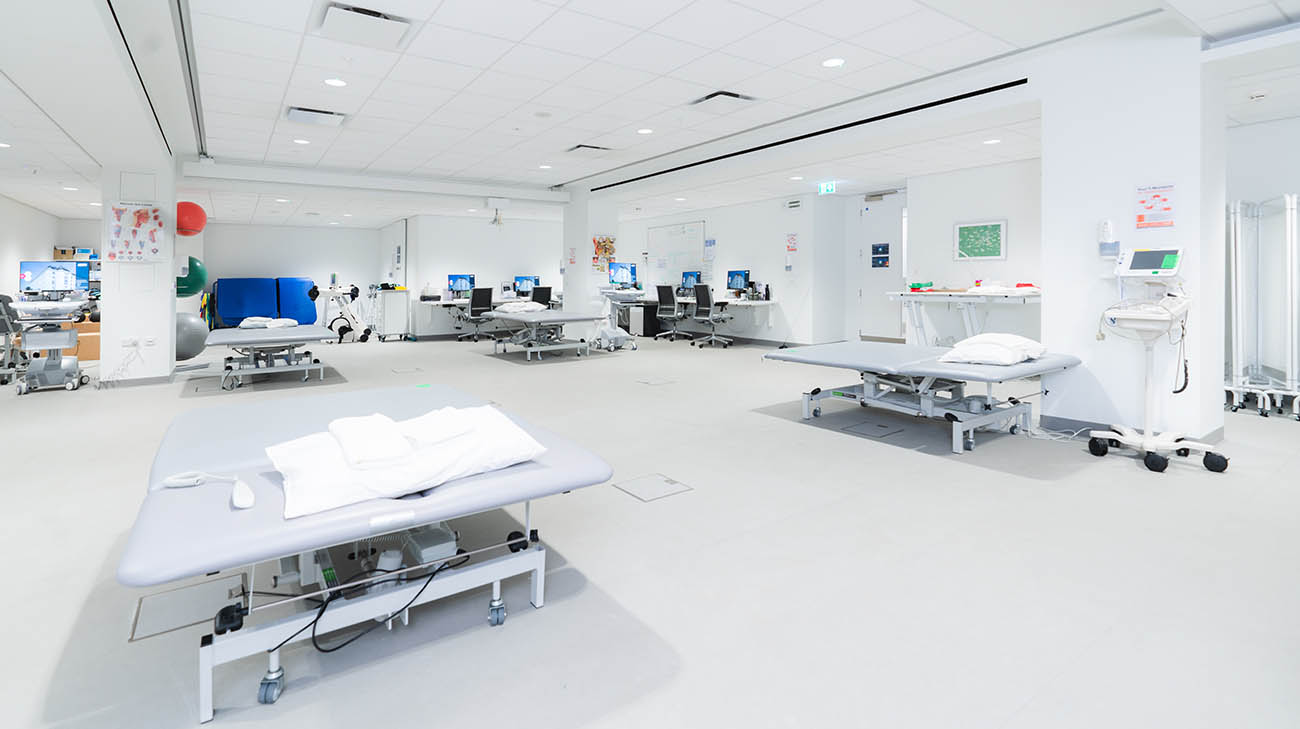
The neurorehabilation unit at Cleveland Clinic London. (Courtesy: Cleveland Clinic)
“We focused on mild word finding difficulties, particularly for the lower frequency words you might use in conversation; the speed at which he could produce verbal language, which had been greatly reduced; and inferential abilities, like reading between the lines. All of these would have a significant impact on him returning to work,” explains Katrina, who has been a speech and language therapist for 24 years.
Not unlike his initial reaction upon awakening from the coma after his accident, Eli was at first skeptical he needed any assistance. Dr. Chandratheva says that’s not unusual. “It’s very common in traumatic brain injuries to having a lack of insight to their cognitive deficits. That’s why it’s important to have an experienced team, as we do here, to manage cases like his.”
Eli relented after a few incidents upon his arrival. At one point he couldn’t count backwards from 20 and he got lost on his way back to his room, believing someone had moved him to a different room.
“It took the therapists a while to drill into me I’d had a massive accident and it would take some work to get back to where I was before. Once I accepted that, it made everything much easier,” he states.
Soon, Eli settled into a routine: an hour of speech and language therapy, an hour of occupational therapy and an hour of physiotherapy each day.
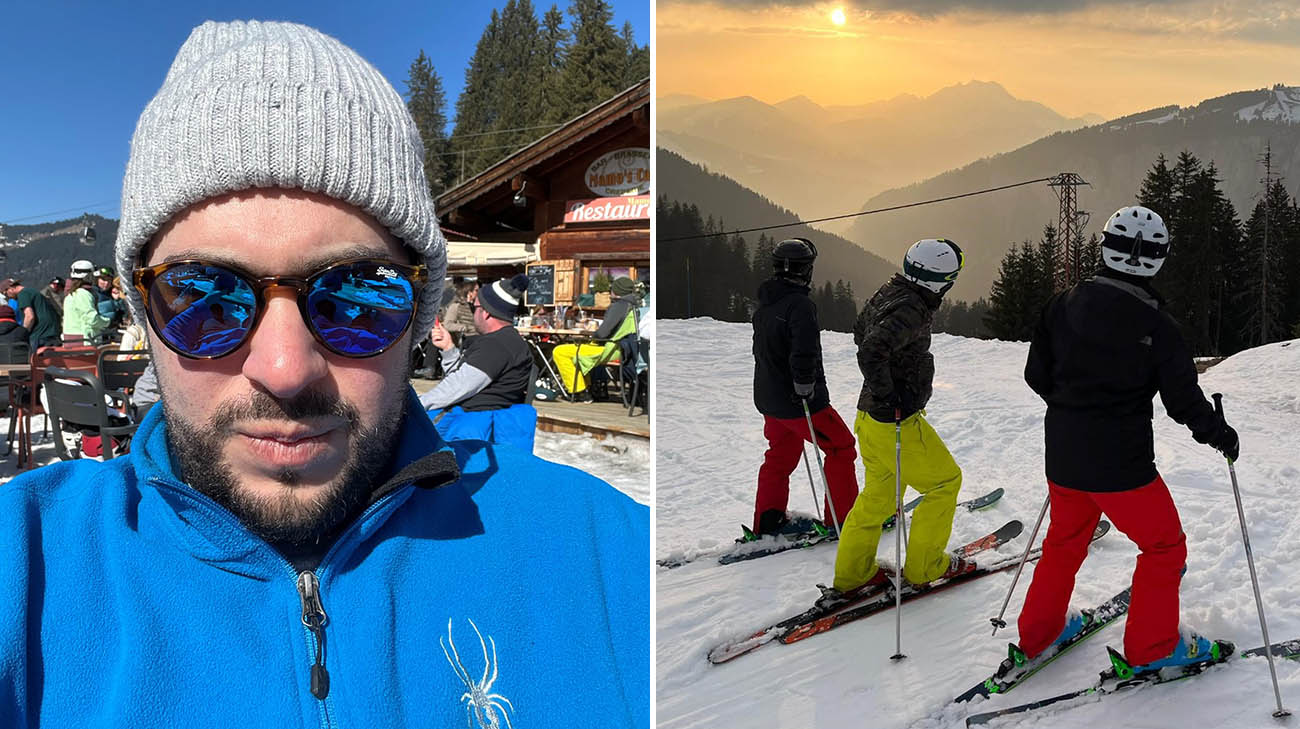
Eli hopes to return to the slopes in March 2024, marking one year after his accident. (Courtesy: Eli Lew)
As time passed, and he regained his abilities, Eli would venture on journeys with a therapist to nearby stores or the Tube, London’s underground railway system. In those sessions, the therapy team would assess progress and areas that needed additional attention.
Adds Katrina, “Some of these joint sessions with occupational and speech therapists put into practice what he’d learned in hospital. Like getting out and talking to strangers, taking in information from different sources, and recording it by note taking. As we saw improvement in these areas, and in navigating his way back to the hospital, we would move to more complex cognitive tasks.”
Eli was motivated to return to his active lifestyle quickly, and that drove him to set and achieve daily and weekly goals for himself.
“Every day I saw progress, which massively helped with my mindset,” he emphasizes. “I built an amazing relationship with each therapist. By the end, it felt like a friendship – they had seen me at my lowest points, and worked with me to a place where they could set me free to the world. I learned to become me again.”
Dr. Chandratheva remarks Eli’s progress was particularly satisfying, as he has been able to regain all his cognitive and physical capabilities. “His was amongst the most serious of brain injuries and amongst the most worrisome of potential consequences, as a young man who was living life to the very fullest.”
After a month, Eli returned home. Within days, he was again playing paddle tennis and a few weeks later returned to work. He also was able to achieve one of his primary goals, flawlessly serving as best man at a friend’s wedding in August 2023. That was important to Eli because, “I wanted to be able to write and give the speech the way I would typically do it. I didn’t want to stand up there and be looked at with pity, and I wasn’t. It went really well.”
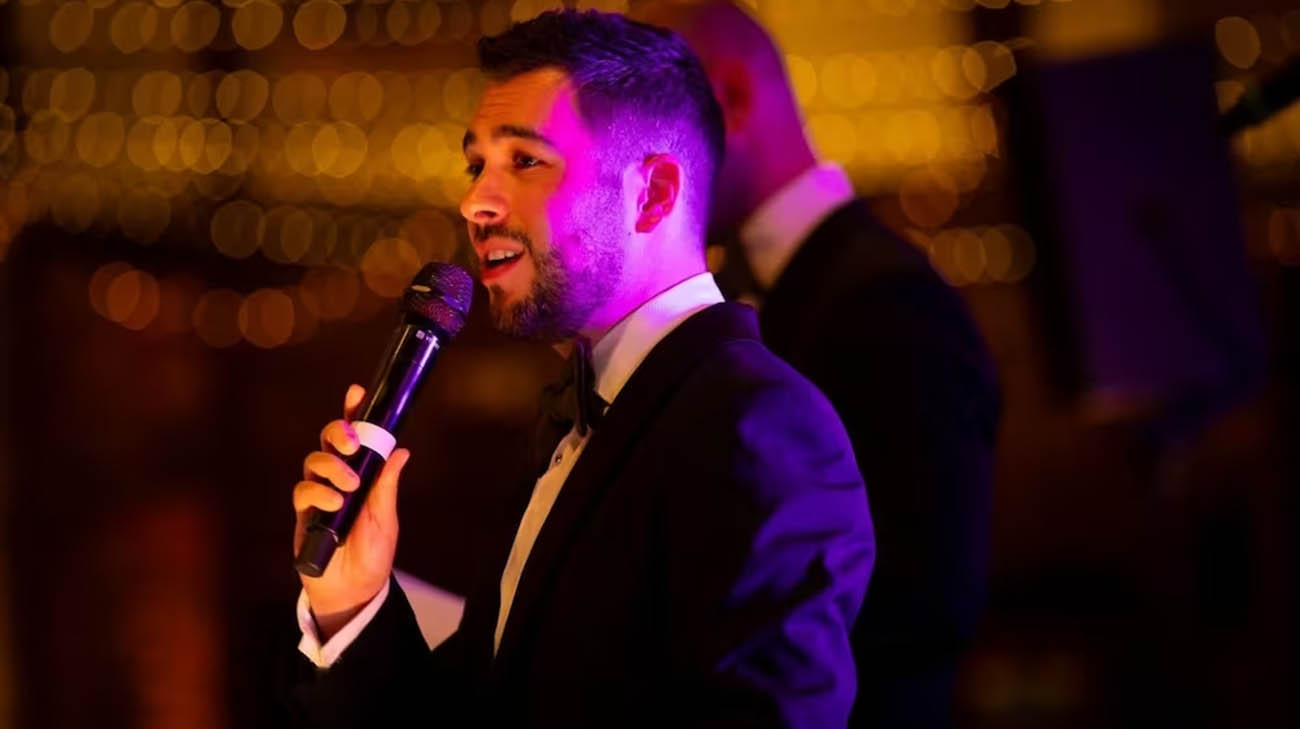
Eli accomplished his goal of making a speech at his best friend's wedding. (Courtesy: Eli Lew)
Now, Eli is making plans for another goal: to return to the Châtel ski slopes in March 2024. On the anniversary of the accident, he hopes to spend a few moments reflecting on what happened and his journey to recovery.
“I learned a lot about myself,” he continues. “One can’t feel down or give up when something like this happens. I look back on this entire experience quite fondly, because it opened my eyes to the person I am, and what I’m capable of, and how much love there is out there for me.”
Related Institutes: Neurological Institute

